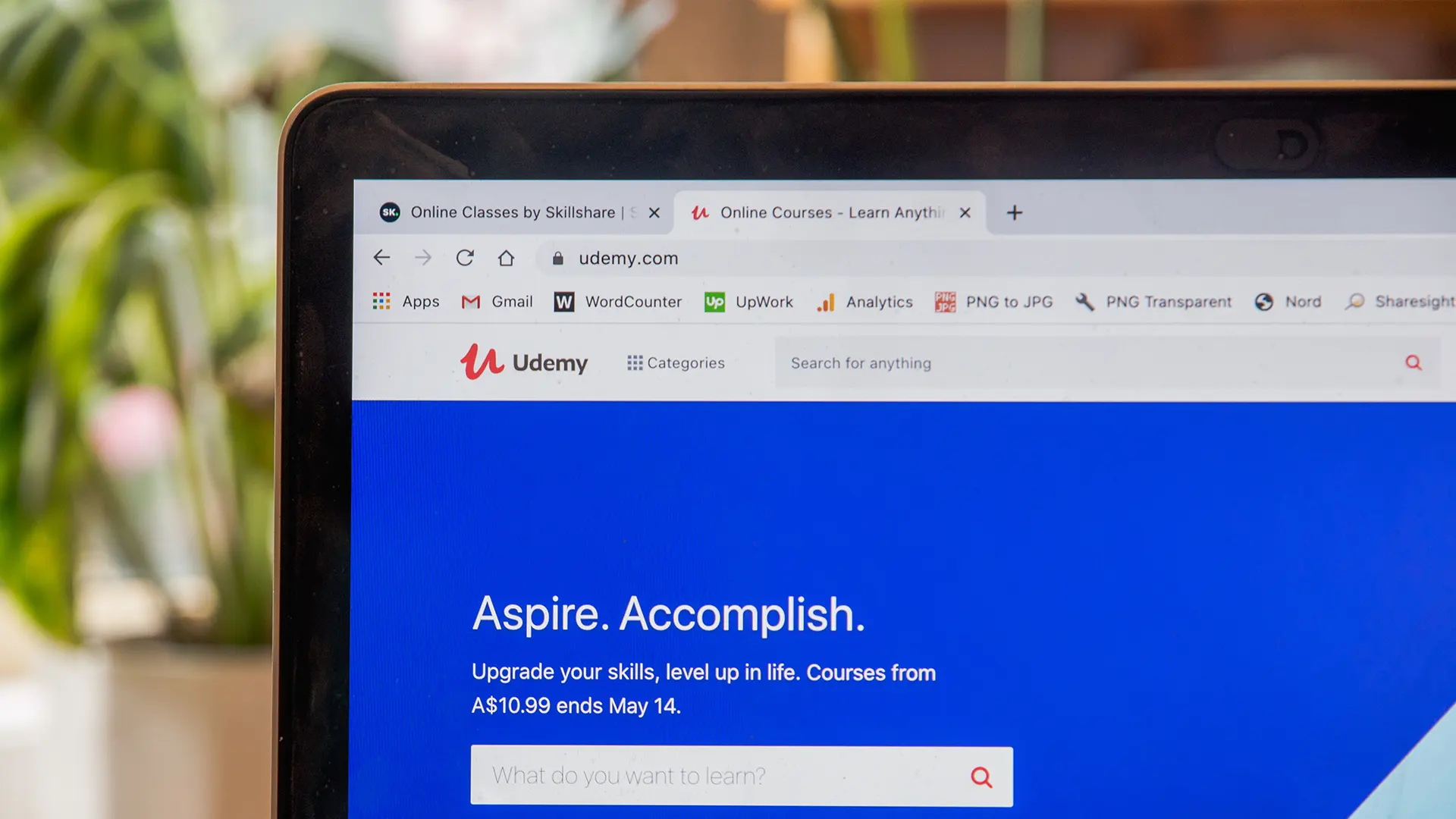MOOCs vs Online Courses: What Suits You Better?
6 min.
Table of contents

6 min.
MOOC or a conventional online course – that's the question here. Are you faced with a decision problem? We make the choice easier for you. Explore the pros and cons of both formats with us and discover your perfect solution in no time.
As individuals seek to expand their skill sets, explore new subjects, or enhance their career prospects, the realm of online education offers a plethora of options. Two prominent contenders in this educational landscape are Massive Open Online Courses (MOOCs) and traditional Online Courses. Navigating this choice requires careful consideration, as the decision between MOOCs and Online Courses holds the key to unlocking a tailored learning journey that aligns with your individual aspirations and preferences. We help you weigh the pros and cons to make an informed decision for your educational journey.
Both MOOCs and traditional online courses have their advantages and disadvantages. Those who are familiar with them are able to decide which format best suits their personal educational goals. First, let's take a closer look at MOOCs.
MOOCs have gained widespread popularity – they have an extensive range of subject offerings and make education accessible to learners across the globe. Despite their numerous advantages, however, they also come with significant limitations that might affect your learning journey.
Pros:
1. Wide Range of Course Offerings: One of the standout benefits of MOOCs is their immense diversity of courses. From computer programming to creative writing, you can find courses on almost any topic imaginable. This unparalleled variety allows you to explore new areas of interest and broaden your knowledge horizons.
2. Accessibility & Flexibility: MOOCs break down geographical barriers, enabling individuals from different corners of the world to access high-quality education. Learners can choose when and where to study, catering to diverse schedules and commitments.
3. Cost-Effectiveness or Free Options: Many MOOCs offer free access to course materials, significantly reducing the financial barrier to education. Even when there are fees, they are generally lower than traditional education costs, making learning affordable for a broader audience.
4. Diverse Learning Methods: MOOCs employ a range of interactive learning methods, including video lectures, quizzes, discussion forums, and peer assessments. These varied approaches engage learners and cater to different learning styles, enhancing overall comprehension and retention.
Cons:
1. Lack of Personalized Attention: Due to the massive number of participants, MOOCs often struggle to provide personalized attention and one-on-one interactions. This lack of individualized guidance can hinder deeper understanding and engagement with the course content.
2. Potential for Low Completion Rates: The open and self-paced nature of MOOCs can lead to high dropout rates. Without a structured learning environment, some learners may struggle to remain motivated and committed, resulting in incomplete courses.
3. Limited Accreditation & Certification: While some MOOCs offer certificates upon completion, these credentials might not carry the same weight as traditional degrees or certifications. This could affect your credibility in certain professional or academic circles.
4. Self-Discipline & Time Management Required: The freedom to set your own study schedule can be a double-edged sword. Without the structure of traditional classroom settings, maintaining self-discipline and effective time management becomes crucial for successful completion.
5. Variable Course Quality: The quality of MOOCs can vary widely, with some courses offering comprehensive materials and engaging instruction, while others may lack depth or interactivity. Ensuring a high-quality learning experience requires thorough research and scrutiny before enrolling.
6. Usually No Tutors or Lecturers: Unlike traditional courses, MOOCs might lack dedicated tutors or lecturers to provide direct guidance. Learners have to rely on self-directed learning and may face challenges when seeking clarification or deeper insights into course content.

Online courses offer a challenging learning experience in a structured and interactive environment. Although fee-based and limited in terms of topic range, they provide internationally recognized qualifications at university level.
Pros:
1. Structured & Guided Learning: Online courses provide a structured curriculum with clear learning objectives, sequenced lessons (modules), and oftentimes defined timelines. This structured approach ensures that learners progress through the material in a logical and organized manner, enhancing comprehension and retention.
2. Interaction with Instructors and Peers: Unlike MOOCs, online courses often prioritize active interaction with instructors and peers. Regular feedback, Q&A sessions, and collaborative projects facilitate a deeper understanding of the subject matter and foster a sense of community among learners.
3. Accreditation & Certification Opportunities: Many online courses are affiliated with reputable educational institutions or organizations, offering recognized certificates or degrees upon completion. These credentials carry weight in both academic and professional settings, bolstering your qualifications.
4. Tailored Learning Experience: Online courses are designed to cater to diverse learning styles and skill levels. With personalized guidance and feedback, learners can address their individual needs and progress at a pace that aligns with their capabilities.
5. Consistent Course Quality: The rigorous screening processes inherent to online courses ensure a higher level of course quality and consistency. Institutions offering online courses often invest in experienced educators and an elaborated educational design.
Cons:
1. Higher Cost: One of the potential drawbacks of online courses is their comparatively higher cost. While this investment is often justified by the structured guidance and recognized credentials, it's important to factor in your budget and long-term goals.
2. Less Flexibility in Scheduling: Online courses may adhere to set schedules, requiring learners to commit to specific class times. This could be less flexible than the self-paced nature of MOOCs. The good news is that at ONSITES Graduate School you benefit from maximum flexibility. You study at your own pace in perfect harmony with your job, family and free time.
3. Limited Course Variety: Online courses might have a narrower selection compared to the vast array of subjects offered by MOOCs. However, this can also mean that the available courses are more carefully curated to meet specific educational needs.
4. Geographical Restrictions in Some Cases: These occur in particular when the study course includes attendance phases for examinations or workshops. However, at ONSITES Graduate School, online courses are totally location-independent. Whether from home, on the road, or traveling: Study from anywhere in the world.
5. Possible Commitment Challenges: The structured nature of online courses requires a higher level of commitment and engagement. This might not suit learners who prefer more flexible and independent study approaches.

The decision between pursuing Massive Open Online Courses (MOOCs) or enrolling in structured Online Courses demands careful consideration. When faced with this choice, several crucial factors can guide you toward the optimal learning journey.

Now it's your turn. With this overview, you will be able to decide which format best suits your needs and life situation. Both formats have their advantages. MOOCs stand out for their variety of topics and cost efficiency; legitimate online courses stand out for their first-class learning content, internationally recognized qualifications, and personal support. How do you decide?
22.01.2024


